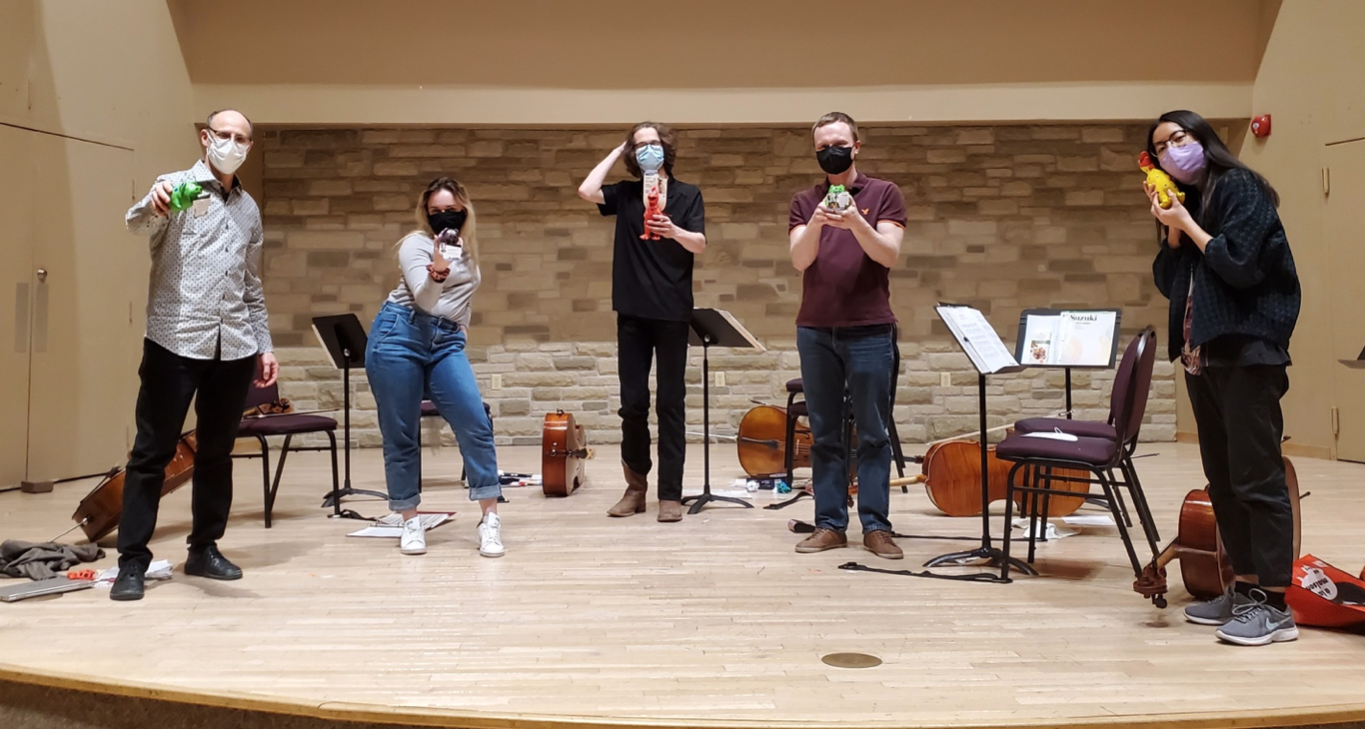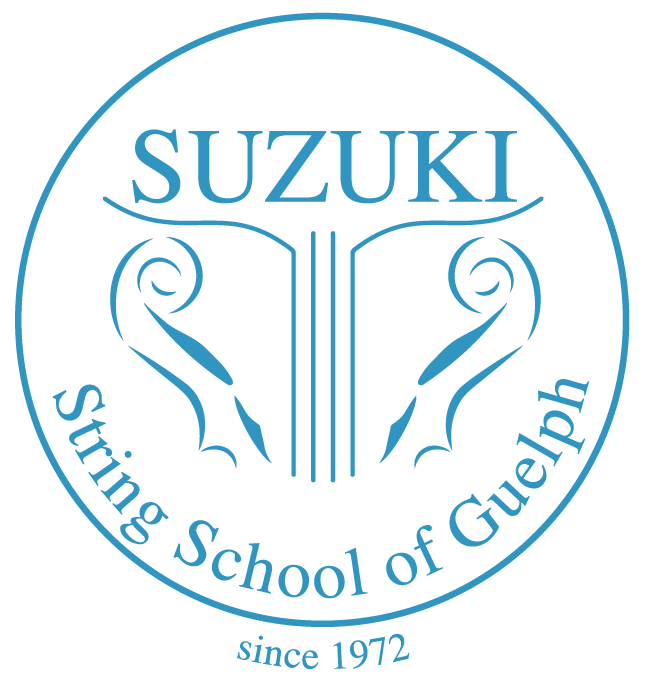
SAA-Approved Long-Term
Teacher Training
This program is a two-year Suzuki pedagogy course offered in violin and cello. The program covers Suzuki Pedagogy Units 1 to 8 of the Suzuki Association of the Americas Course Syllabi as well as the Practicum Unit.
The weekly 3-hour course seminars include discussions of the history and philosophy of the Suzuki Method® and its application in the context of private and group lessons. They also explore the processes of technical and musical development through volumes 1-8 of the Suzuki repertoire as well as scales, technical exercises, studies and supplementary repertoire.
The course also covers teaching strategies, childhood development, learning challenges and Body Mapping®. Course participants spend a minimum of 2 hours per week observing and writing reports on private and group lessons. These observations can be done live or online at the SSSG, through videos, and/or Suzuki lessons given by recommended Suzuki teachers.
The curriculum also includes readings and written assignments. In first year, course participants are assigned to attend the private lessons of at least 1 student and practice with that student once a week. They are also a teaching assistant for one group class throughout the year. In second year, course participants are assigned to teach at least 1 beginner student under the supervision of the trainer. They also co-teach a group class throughout the year. Students from Laurier (Wilfrid Laurier University) may claim this credential as equivalent to a 1.0 credit.
-
In the fall, a first-year cohort in violin/viola will be taught by Suzuki teacher-trainer Paule Barsalou and in cello by Suzuki teacher-trainer David Evenchick.
Classes will be held on Fridays, at a time to be determined according to the participants’ availability. Classes will start with the Every Child Can! course on Friday, September 18, 2024.
Classes will be a mix of in-person at Laurier’s Savvas Chamberlain Music Building and online via Zoom. For violin/viola training, Laurier students and others who live in, or near, Waterloo will attend in person. Others may attend via Zoom but will be expected to come to Waterloo for periodic classes at Laurier. In the case of participants from remote areas or out-of-province, an arrangement may be made for the trainer to visit your location for in-person training at least once per school year. Cello classes will be mostly online via Zoom with in-person classes at least once per school year as arranged by the trainer.
-
All first-year applicants must submit the following information. If you are a second-year student, but completed your first year anywhere other than Wilfrid Laurier University, you must also submit the following.
Please email or mail the following to Paule Barsalou at paulebarsalou@gmail.com
1-page curriculum vitae focusing on music education and any experience working with children
2 letters of recommendation: one of them from your violin teacher if you have one.
Short essay on your perception of talent education and the reasons for your interest in taking Suzuki teacher training.
Letter of intent to be signed by the participant (Why do you want to take this course? State your commitment to the two year program.)
Vulnerable Sector Check from your city of residence.
-
Students from other universities and non-university students are required to audition with the SAA. There are two different options:
1/ Intermediate level (for approval through Unit 8):
Cello: Faure Elegie
Violin: Bach Concerto in a minor, movement I, BWV 1041
or
2/ Comprehensive: For All Training Courses
Cello: Haydn Concerto in C Major, movement I or Boccherini Concerto in B-Flat, movement I
Violin: Mozart Concerto No. 4, movement I or Concerto No. 5, movement I—must include cadenza
Click here to find out more about the SAA audition process: https://suzukiassociation.org/teachers/teacher-trainers/teacher-trainers/saa-teacher-development-program/
-
Membership in the Suzuki Association of the Americas (SAA) is required. Through the SSSG, Canadian university students are eligible for a reduced membership fee for the Suzuki Association of the Americas (SAA) and Suzuki Music/Musique Canada (SMMC). The cost of that fee is $70 CAD.
Applicants who are not Laurier students and are not an SAA member should sign-up to become a member directly through the SAA website.
Canadian applicants are strongly encouraged to sign-up for the dual membership fee for SAA and SMMC. To learn more visit https://suzukiassociation.org
-
Application Fee
An Application Fee of $75 is due when you apply.
Payment can be made by -
e-transfer to accounting@suzukistringschoolguelph.ca / $75
credit card payment (4% service charge) / $78
The Application Fee is non-refundable, unless you are not accepted into the program.
Note - Returning 2nd year students are exempt from the Application Fee.
Tuition Fee
Once accepted into the program, you will be invoiced for the tuition fee of $2,500 per year. SAA membership or materials requested below will be added to to your tuition invoice.
Bursaries are available upon request up to $1,250. Please contact accounting@suzukistringschoolguelph.ca for more information.
-
All dates may be subject to change.
Weekly 3-hour seminars are held on Fridays, 9 am to 12 PM ET. Please contact us to let us know if you have time restrictions.
Violinists please contact Paule Barsalou paulebarsalou@gmail.com
Cellists please contact David Evenchick evenchickdavid@gmail.com
Fall Calendar
September 18, 2024 - First class
October 18, 2024 - Fall reading week, no classes.
December 6, 2024 - Last class
Winter Calendar
January 10, 2025 - First class
February 21, 2025 - Winter reading week, no classes.
April 6, 2025 - Last class
-
1. Seminar (3 hours a week)
2. Observation (39 hours) – live or online at the SSSG, through videos, and/or Suzuki lessons given by recommended Suzuki teachers around the world.
3. Coursework (papers and readings)
4. Practice mentoring – Observe a selected student’s 30-minute weekly private lesson with the intent of being that student's practice mentor by the second term. The time spent observing can be counted toward required observation hours for the course. To ensure accessibility, this component may be done online.
5. Group class Observation/TA – Observe and/or assist in a 30 or 45-minute group class on a regular basis throughout the year. The time spent observing can be counted toward required observation hours for the course. If necessary, this component may be done online to ensure accessibility.
-
1. Seminar (3 hours a week, including Practicum)
2. Observation (32 hours) – live or online at the SSSG, through videos, and/or Suzuki lessons given by recommended Suzuki teachers around the world.
3. Coursework (papers and readings)
4. Practicum: 1-2 hours a week
· Beginner private lessons or master class (4 students/hr) periodically reviewed by the trainer.
· Group class periodically reviewed by the trainer.
· Each participant will be assigned a practicum partner. Practicum partners will take notes on each other’s lessons which will be discussed during the seminar each week.
· More mature teacher taking the course can use their own students and group classes for this component of the course.
5. Lecture Recital: This is the graduation project for 2nd year students.
